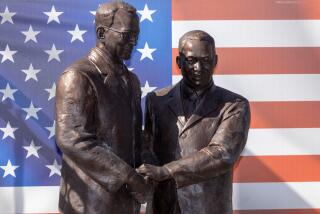The civil rights movement began one historic...
- Share via
The civil rights movement began one historic day in Montgomery, Ala., almost 37 years ago, when a black seamstress would not give up her seat on a bus to a white man.
That simple act of rebellion by Rosa Parks led, after her arrest, to a 382-day boycott of the Montgomery bus system by blacks, a U.S. Supreme Court test case, the desegregation of buses--and the emergence of Martin Luther King Jr. as a civil rights leader.
Ultimately--as activists throughout the South took heart from the success of the Montgomery boycott and the legal challenge to segregation--it led to the peeling away, one by one, of the region’s infamous Jim Crow laws.
The former seamstress has now told her story in a book. And, between 6 and 8 p.m. Tuesday, Parks, now 79, a secretary-
receptionist since 1965 in the Detroit office of Democratic Congressman John Conyers, will be in Pasadena, at the Black & Latino Multicultural Book Center, 23 N. Mentor St., to sign copies of “My Story.”
It all started Dec. 1, 1955, when a white bus driver ordered a row of black passengers to get up so a white man could sit down.
As Parks recalled in an interview, the bus driver said: “You all make it light on yourselves and let me have those seats.”
Three black passengers got up.
But Parks, weary from working
Parks will be in Pasadena Tuesday.
all day as a seamstress at a downtown department store, held her ground, even inviting the driver to summon police. When two officers arrived, one asked her why she would not stand up.
“I don’t think I should have to,”
Parks replied. “Why do you push us around so?”
The policeman answered, “I don’t know, but the law is the law, and you are under arrest.”
Word of Parks’ arrest spread quickly, and soon the famous Montgomery boycott was underway. A year later, after the Supreme Court upheld a federal court ruling that bus segregation was unconstitutional, Parks took a seat in the front of a Montgomery bus. It was a bittersweet moment, she said.
“I don’t recall that I felt anything great about it,” she said. “It didn’t feel like a victory, actually. There still had to be a great deal to do.”
More to Read
Sign up for Essential California
The most important California stories and recommendations in your inbox every morning.
You may occasionally receive promotional content from the Los Angeles Times.










